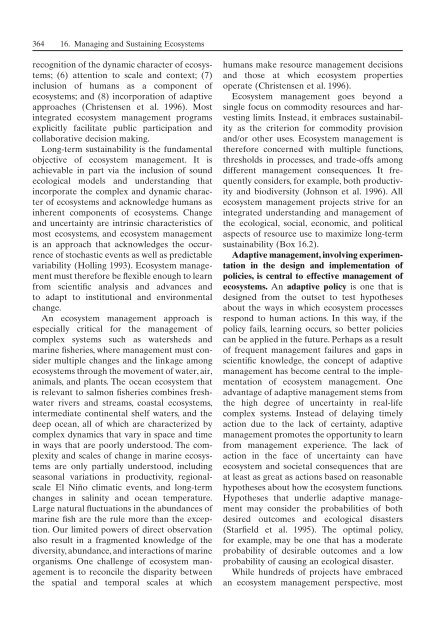Principles of terrestrial ecosystem ecology.pdf
Principles of terrestrial ecosystem ecology.pdf
Principles of terrestrial ecosystem ecology.pdf
Create successful ePaper yourself
Turn your PDF publications into a flip-book with our unique Google optimized e-Paper software.
364 16. Managing and Sustaining Ecosystems<br />
recognition <strong>of</strong> the dynamic character <strong>of</strong> <strong>ecosystem</strong>s;<br />
(6) attention to scale and context; (7)<br />
inclusion <strong>of</strong> humans as a component <strong>of</strong><br />
<strong>ecosystem</strong>s; and (8) incorporation <strong>of</strong> adaptive<br />
approaches (Christensen et al. 1996). Most<br />
integrated <strong>ecosystem</strong> management programs<br />
explicitly facilitate public participation and<br />
collaborative decision making.<br />
Long-term sustainability is the fundamental<br />
objective <strong>of</strong> <strong>ecosystem</strong> management. It is<br />
achievable in part via the inclusion <strong>of</strong> sound<br />
ecological models and understanding that<br />
incorporate the complex and dynamic character<br />
<strong>of</strong> <strong>ecosystem</strong>s and acknowledge humans as<br />
inherent components <strong>of</strong> <strong>ecosystem</strong>s. Change<br />
and uncertainty are intrinsic characteristics <strong>of</strong><br />
most <strong>ecosystem</strong>s, and <strong>ecosystem</strong> management<br />
is an approach that acknowledges the occurrence<br />
<strong>of</strong> stochastic events as well as predictable<br />
variability (Holling 1993). Ecosystem management<br />
must therefore be flexible enough to learn<br />
from scientific analysis and advances and<br />
to adapt to institutional and environmental<br />
change.<br />
An <strong>ecosystem</strong> management approach is<br />
especially critical for the management <strong>of</strong><br />
complex systems such as watersheds and<br />
marine fisheries, where management must consider<br />
multiple changes and the linkage among<br />
<strong>ecosystem</strong>s through the movement <strong>of</strong> water, air,<br />
animals, and plants. The ocean <strong>ecosystem</strong> that<br />
is relevant to salmon fisheries combines freshwater<br />
rivers and streams, coastal <strong>ecosystem</strong>s,<br />
intermediate continental shelf waters, and the<br />
deep ocean, all <strong>of</strong> which are characterized by<br />
complex dynamics that vary in space and time<br />
in ways that are poorly understood. The complexity<br />
and scales <strong>of</strong> change in marine <strong>ecosystem</strong>s<br />
are only partially understood, including<br />
seasonal variations in productivity, regionalscale<br />
El Niño climatic events, and long-term<br />
changes in salinity and ocean temperature.<br />
Large natural fluctuations in the abundances <strong>of</strong><br />
marine fish are the rule more than the exception.<br />
Our limited powers <strong>of</strong> direct observation<br />
also result in a fragmented knowledge <strong>of</strong> the<br />
diversity, abundance, and interactions <strong>of</strong> marine<br />
organisms. One challenge <strong>of</strong> <strong>ecosystem</strong> management<br />
is to reconcile the disparity between<br />
the spatial and temporal scales at which<br />
humans make resource management decisions<br />
and those at which <strong>ecosystem</strong> properties<br />
operate (Christensen et al. 1996).<br />
Ecosystem management goes beyond a<br />
single focus on commodity resources and harvesting<br />
limits. Instead, it embraces sustainability<br />
as the criterion for commodity provision<br />
and/or other uses. Ecosystem management is<br />
therefore concerned with multiple functions,<br />
thresholds in processes, and trade-<strong>of</strong>fs among<br />
different management consequences. It frequently<br />
considers, for example, both productivity<br />
and biodiversity (Johnson et al. 1996). All<br />
<strong>ecosystem</strong> management projects strive for an<br />
integrated understanding and management <strong>of</strong><br />
the ecological, social, economic, and political<br />
aspects <strong>of</strong> resource use to maximize long-term<br />
sustainability (Box 16.2).<br />
Adaptive management, involving experimentation<br />
in the design and implementation <strong>of</strong><br />
policies, is central to effective management <strong>of</strong><br />
<strong>ecosystem</strong>s. An adaptive policy is one that is<br />
designed from the outset to test hypotheses<br />
about the ways in which <strong>ecosystem</strong> processes<br />
respond to human actions. In this way, if the<br />
policy fails, learning occurs, so better policies<br />
can be applied in the future. Perhaps as a result<br />
<strong>of</strong> frequent management failures and gaps in<br />
scientific knowledge, the concept <strong>of</strong> adaptive<br />
management has become central to the implementation<br />
<strong>of</strong> <strong>ecosystem</strong> management. One<br />
advantage <strong>of</strong> adaptive management stems from<br />
the high degree <strong>of</strong> uncertainty in real-life<br />
complex systems. Instead <strong>of</strong> delaying timely<br />
action due to the lack <strong>of</strong> certainty, adaptive<br />
management promotes the opportunity to learn<br />
from management experience. The lack <strong>of</strong><br />
action in the face <strong>of</strong> uncertainty can have<br />
<strong>ecosystem</strong> and societal consequences that are<br />
at least as great as actions based on reasonable<br />
hypotheses about how the <strong>ecosystem</strong> functions.<br />
Hypotheses that underlie adaptive management<br />
may consider the probabilities <strong>of</strong> both<br />
desired outcomes and ecological disasters<br />
(Starfield et al. 1995). The optimal policy,<br />
for example, may be one that has a moderate<br />
probability <strong>of</strong> desirable outcomes and a low<br />
probability <strong>of</strong> causing an ecological disaster.<br />
While hundreds <strong>of</strong> projects have embraced<br />
an <strong>ecosystem</strong> management perspective, most


